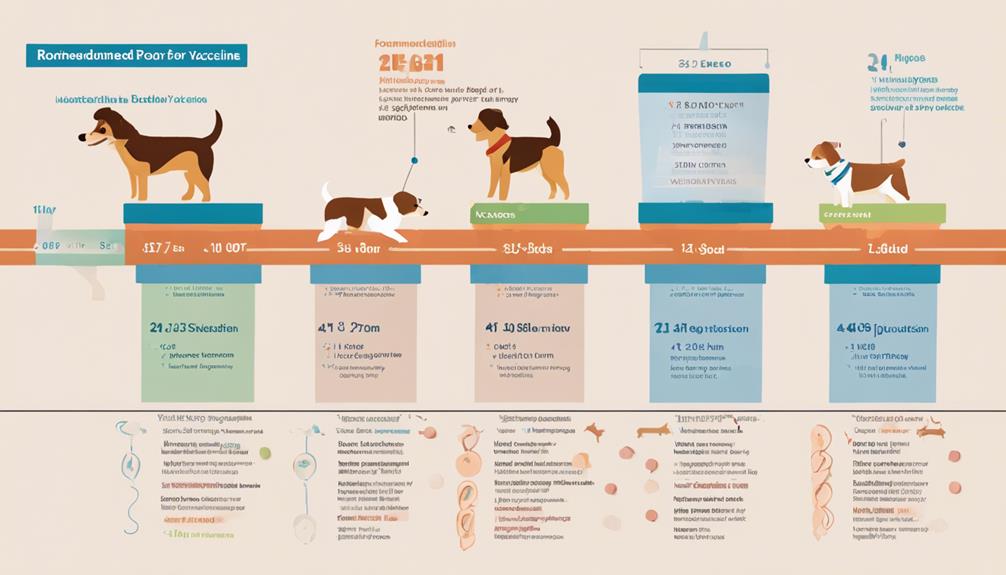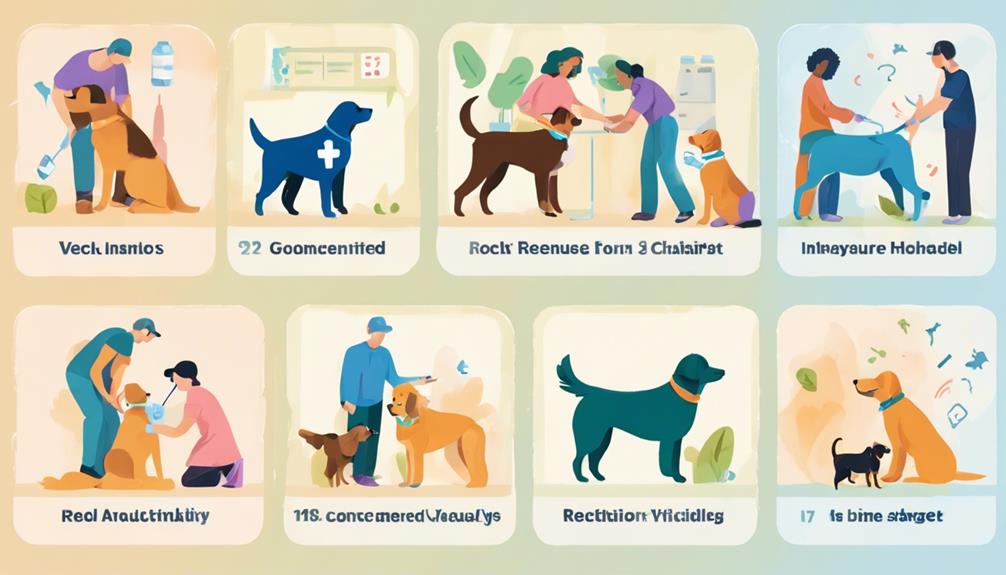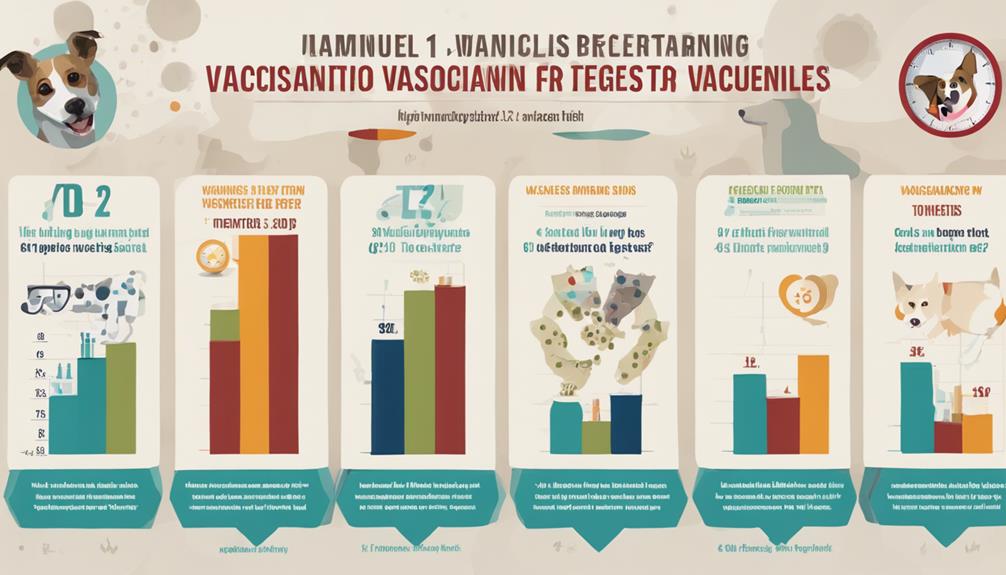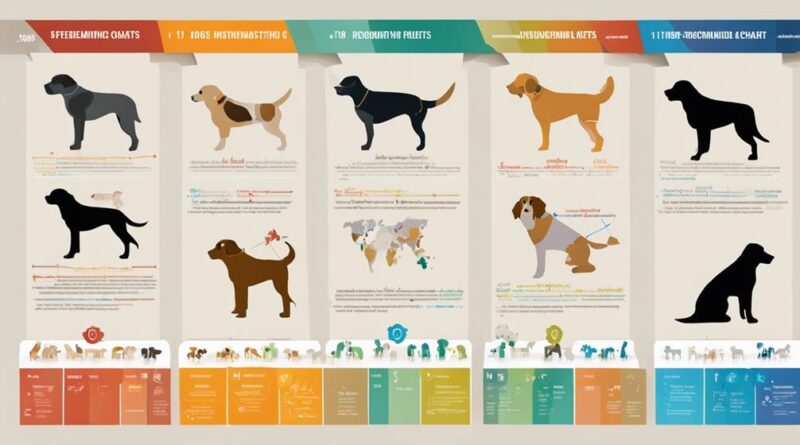Top 11 Recommended Vaccination Schedules for Dogs
Ensure your dog's health with these top 11 vaccination schedules. Start with core vaccines like distemper, parvovirus, adenovirus, and rabies. Master the puppy vaccination schedule while focusing on timely shots and proper socialization. For adults, maintain immunity through regular boosters and disease-specific vaccines. Monitor for side effects and tailor non-core vaccines to your dog's lifestyle. Key vaccines such as rabies require follow-up boosters to protect your community. Stay informed to safeguard your furry friend effectively.
Core Vaccines
When considering core vaccines for your dog, prioritizing their overall health and well-being is paramount. Core vaccines are essential for preventing serious diseases that can be life-threatening to your furry companion. These vaccines are considered vital due to the widespread nature of the diseases they protect against and the potential risk they pose to both your dog and other animals.
Vaccination effectiveness is a crucial factor to consider when deciding on core vaccines for your dog. The core vaccines recommended for dogs have been scientifically proven to be highly effective in preventing diseases such as rabies, canine distemper, canine parvovirus, and canine adenovirus. These vaccines work by stimulating your dog's immune system to produce antibodies that can recognize and fight off these specific diseases if they're ever exposed to them.
Ensuring that your dog receives these core vaccines at the appropriate times as recommended by your veterinarian is vital for maintaining their health and preventing the spread of infectious diseases. By following the recommended vaccination schedule, you can help protect not only your dog but also other pets in your community. Remember, vaccination effectiveness is maximized when vaccines are administered on schedule and kept up to date throughout your dog's life.
Puppy Vaccination Schedule
Commencing your puppy's vaccination schedule promptly is crucial for establishing a strong foundation of immunity against preventable diseases. Puppies are highly susceptible to various illnesses due to their developing immune systems, making timely vaccinations imperative. The primary vaccines recommended for puppies include those for distemper, parvovirus, adenovirus, and rabies, among others. These vaccines are typically administered in a series of doses to ensure optimal protection.
Behavioral training plays a significant role during the vaccination schedule for puppies. It's essential to start early with positive reinforcement techniques to help your puppy feel more comfortable during vet visits and vaccinations. By associating these experiences with rewards and praise, you can help reduce anxiety and fear in your puppy, making the vaccination process smoother for both you and your furry companion.
Socialization tips are also crucial during the vaccination schedule for puppies. Introducing your puppy to various environments, people, and other animals in a safe manner can help prevent behavioral issues in the future. Proper socialization can contribute to a well-adjusted and confident adult dog. However, it's important to avoid exposing your puppy to unvaccinated or sick animals until they've completed their vaccination series to prevent the risk of contracting diseases.
Adult Dog Vaccination Protocol
For adult dogs, maintaining a consistent vaccination protocol is essential to ensure continued protection against infectious diseases. Ensuring your dog receives the appropriate vaccines at the right time is crucial for bolstering their immune system and preventing the spread of potentially deadly illnesses.
Here is a comprehensive adult dog vaccination protocol to guide you:
- Regular Boosters: Adult dogs require regular booster shots to maintain their immunity against common diseases.
- Core Vaccines: Core vaccines, such as those for distemper, parvovirus, adenovirus, and rabies, should be administered to all adult dogs.
- Non-Core Vaccines: Depending on factors like lifestyle and geographic location, non-core vaccines for diseases like Bordetella (kennel cough) or Leptospirosis may be recommended.
- Monitoring for Side Effects: Keep a close eye on your dog after vaccinations for any potential side effects, such as mild fever, lethargy, or localized swelling. While these are generally mild and short-lived, contact your veterinarian if you notice anything concerning.
Maintaining a robust vaccination protocol not only protects your dog but also contributes to the overall community's health by preventing the spread of contagious diseases. By staying informed and following recommended guidelines, you can help ensure your furry companion enjoys a healthy and happy life.
Rabies Vaccination Guidelines
To ensure comprehensive protection for your adult dog, understanding the specific guidelines for administering rabies vaccinations is paramount in safeguarding their health against this deadly viral disease.
Rabies is a zoonotic disease that poses a significant risk to both animals and humans, making vaccination crucial. The rabies vaccine is highly effective in preventing the onset of rabies if a vaccinated dog is exposed to the virus. The guidelines recommend initial vaccination of puppies at around 12-16 weeks of age, with a booster shot one year later. Subsequently, revaccination every 1-3 years is typically advised, depending on the type of vaccine used and local regulations.
While the rabies vaccine is generally safe, some dogs may experience mild side effects such as soreness at the injection site, mild fever, or decreased appetite. Severe reactions are rare but may include vomiting, diarrhea, or allergic responses. It's essential to monitor your dog after vaccination and consult your veterinarian if you notice any concerning symptoms.
Adhering to the recommended vaccination schedule not only protects your dog but also helps prevent the spread of rabies in the community.
Canine Distemper Vaccination
Understanding the importance of canine distemper vaccination is crucial for safeguarding your dog's health against this highly contagious and potentially deadly viral disease. Canine distemper is a serious illness that affects a dog's respiratory, gastrointestinal, and nervous systems.
Here are four key points to consider when it comes to canine distemper prevention and vaccine effectiveness:
- Vaccine Schedule: Puppies should receive their first distemper vaccination at around 6 to 8 weeks of age, with boosters every 3-4 weeks until they're 16 weeks old. Adult dogs with an unknown vaccination history should also receive a series of two distemper vaccinations.
- Vaccine Effectiveness: The canine distemper vaccine is highly effective at preventing the disease. However, it's essential to follow the recommended vaccination schedule to ensure maximum protection.
- Booster Shots: After the initial puppy series, dogs should receive booster shots at regular intervals throughout their lives to maintain immunity against distemper.
- Prevention: Apart from vaccination, preventing exposure to infected animals and environments is crucial in reducing the risk of canine distemper. Keep your dog away from wildlife, shelters, and other dogs of unknown vaccination status to minimize the chances of contracting the disease.
Parvovirus Vaccination Schedule
Commencing the parvovirus vaccination schedule for your dog is a critical step in safeguarding their health against this highly contagious and potentially deadly viral infection. Parvovirus is a resilient virus that can survive in the environment for extended periods, posing a significant risk to unvaccinated dogs. The vaccine for parvovirus is highly effective in preventing this disease and is considered a core vaccination for all dogs.
The parvovirus vaccine is typically administered as part of a combination vaccine that also protects against other common diseases like distemper and adenovirus. Puppies should receive their first dose of the parvovirus vaccine at around 6-8 weeks of age, with additional boosters given every 3-4 weeks until they're around 16 weeks old. Adult dogs with unknown vaccination history or those who've never been vaccinated against parvovirus should also receive the initial series of vaccines, followed by regular boosters to ensure continued protection.
Proper vaccination is key in parvovirus prevention, as it helps build immunity against the virus and reduces the risk of infection. While the vaccine is highly effective, it's essential to follow the recommended vaccination schedule to maximize its protective benefits. Consult with your veterinarian to establish a vaccination plan tailored to your dog's specific needs and lifestyle.
Bordetella Vaccine Timing

When administering the Bordetella vaccine to your dog, consider the optimal timing based on their age and risk factors. Vaccination against Bordetella bronchiseptica, the bacterium responsible for kennel cough, is crucial for maintaining your dog's respiratory health. Here are some key points to keep in mind:
- Puppy Vaccination: Puppies are highly susceptible to kennel cough due to their developing immune systems. It's recommended to start Bordetella vaccination as early as 6-8 weeks of age to provide early protection.
- Booster Shots: To ensure continued immunity, booster shots are necessary. A booster shot should be given within 2-4 weeks after the initial Bordetella vaccination, followed by regular boosters as advised by your veterinarian.
- High-Risk Environments: If your dog frequently socializes in high-risk environments such as dog parks, boarding facilities, or training classes, consider more frequent boosters to enhance protection against kennel cough.
- Annual Revaccination: Even if your dog isn't in constant contact with other dogs, annual revaccination against Bordetella is often recommended to maintain optimal immunity levels and safeguard their respiratory health.
Leptospirosis Immunization Plan
For effective prevention against leptospirosis in dogs, a strategic immunization plan is essential to safeguard their health. Leptospirosis is a bacterial disease that can have serious consequences if not properly prevented through vaccination. Vaccination is highly effective in protecting dogs from this potentially fatal illness, making it a crucial component of their overall health care regimen.
The leptospirosis vaccine is typically administered as part of a combination vaccine that also includes protection against other common diseases. The initial vaccination is usually given in two doses, 2-4 weeks apart, to ensure optimal immunity. After the initial series, a booster shot is recommended annually to maintain protection levels.
It's important to note that leptospirosis is a zoonotic disease, which means it can be transmitted from animals to humans. By vaccinating your dog against leptospirosis, you not only protect their health but also reduce the risk of transmission to your family members.
When considering the leptospirosis immunization plan for your dog, consult with your veterinarian to determine the most appropriate schedule based on your pet's lifestyle and risk factors. Together with regular veterinary check-ups and preventive care, a well-rounded vaccination plan is key to keeping your furry companion healthy and happy.
Lyme Disease Vaccination Protocol

The Lyme disease vaccination protocol for dogs is a crucial aspect of preventive healthcare to combat this tick-borne illness effectively. Lyme disease is caused by the bacterium Borrelia burgdorferi, transmitted through the bite of infected ticks, particularly the Ixodes species.
Here's what you need to know about the vaccination protocol:
- Vaccine Administration: The Lyme disease vaccine is usually administered as an initial series of two doses, given 2-4 weeks apart, followed by annual boosters to maintain immunity.
- Timing: Puppies can start the Lyme disease vaccination as early as 9 weeks of age. However, consult your veterinarian to determine the best timing based on the prevalence of Lyme disease in your area.
- Preventive Measures: While vaccination is essential, preventive measures such as tick control are equally important. Use tick preventatives recommended by your veterinarian and regularly check your dog for ticks, especially after outdoor activities.
- Monitoring: After vaccination, monitor your dog for any adverse reactions. While uncommon, symptoms like lethargy, swelling, or hives at the injection site should be reported to your veterinarian promptly.
Canine Influenza Shots
Canine influenza shots are essential components of preventive healthcare for dogs, safeguarding them against this contagious respiratory disease. Canine flu, caused by two main strains – H3N8 and H3N2, can lead to symptoms like coughing, sneezing, nasal discharge, fever, lethargy, and reduced appetite. Vaccination is crucial for canine flu prevention, especially in high-risk environments like dog parks, boarding facilities, and grooming salons.
The efficacy of the canine influenza vaccine has been demonstrated in reducing the severity and duration of symptoms, lowering the risk of complications, and decreasing viral shedding. Vaccination helps in building immunity against the specific strains included in the vaccine, providing protection to your furry companion.
It is recommended to follow a primary vaccination schedule, typically consisting of two doses given 2-4 weeks apart, followed by regular boosters to maintain immunity. Your veterinarian can provide guidance on the most suitable vaccination schedule based on your dog's risk factors and lifestyle.
Remember that prevention is key when it comes to canine influenza. By staying up to date with your dog's vaccinations and following your veterinarian's recommendations, you're taking important steps to protect your canine companion from this potentially serious respiratory illness.
Vaccination Schedule for Senior Dogs

How often should senior dogs receive vaccinations to maintain their immunity against preventable diseases?
Vaccination schedules for senior dogs play a crucial role in ensuring their continued health and protection against various illnesses. As dogs age, their immune systems may weaken, making them more susceptible to certain diseases. To address this, a tailored vaccination plan is essential to support senior wellness and boost age-related immunity.
Here is a recommended vaccination schedule for senior dogs:
- Consultation: Schedule a comprehensive veterinary consultation to assess your senior dog's individual health status and vaccination needs.
- Core Vaccines: Administer core vaccines such as rabies, distemper, parvovirus, and adenovirus to provide essential protection against common and severe diseases.
- Non-Core Vaccines: Consider non-core vaccines based on your senior dog's lifestyle, exposure risk, and geographic location to safeguard against additional diseases like leptospirosis or Lyme disease.
- Regular Booster Shots: Follow up with regular booster shots as recommended by your veterinarian to maintain optimal immunity levels and ensure continued protection throughout your senior dog's life.
Frequently Asked Questions
Can My Dog Have an Adverse Reaction to Vaccinations?
Yes, your dog can have an adverse reaction to vaccinations. Vaccine safety is crucial, as there are risks involved. Allergic reactions are possible, with symptoms such as swelling, hives, or difficulty breathing.
It's essential to monitor your dog after vaccination and seek immediate veterinary attention if you notice any concerning signs. Understanding the potential for adverse reactions can help you safeguard your pet's health and well-being.
How Often Should I Update My Dog's Vaccination Records?
You should update your dog's vaccination records based on the recommended vaccination frequency for each vaccine. This ensures the vaccine effectiveness and your dog's protection against diseases.
Stay informed about the specific vaccination schedule for each disease to keep your dog healthy.
Regular updates to your dog's vaccination records are crucial for maintaining immunity and preventing the spread of contagious diseases among dogs.
Are There Any Alternative Vaccination Options for Dogs?
When considering vaccinations for your dog, it's essential to prioritize their health and safety. While herbal alternatives and homeopathic options may be available, it's crucial to consult with a qualified veterinarian first.
These alternative methods may not provide the same level of protection as traditional vaccines. Your vet can help you make informed decisions based on your dog's individual needs and lifestyle to ensure they receive the best possible care.
Can My Dog Be Vaccinated if They Have a Preexisting Health Condition?
If your dog has a preexisting health condition, you should consult with your veterinarian before vaccinating. Certain health risks can arise when vaccinating dogs with underlying conditions.
Precautions must be taken to ensure the safety of your pet. Your vet will assess the specific situation and may adjust the vaccination schedule or recommend alternative options to minimize any potential harm.
Always prioritize your dog's well-being when considering vaccinations alongside existing health conditions.
What Should I Do if I Miss a Scheduled Vaccination Appointment for My Dog?
If you miss a scheduled vaccination appointment for your dog, promptly contact your veterinarian to discuss rescheduling options. Delaying vaccinations can leave your dog vulnerable to diseases. Your vet may recommend catch-up vaccinations to ensure your dog is protected.
Missing a vaccination appointment shouldn't be a reason to skip future vaccines as this can compromise your dog's health. Stay proactive by rescheduling appointments and following your vet's recommendations for preventative measures.
Conclusion
In conclusion, following a proper vaccination schedule is crucial to ensuring your dog's health and protection against various diseases.
By adhering to the recommended vaccination protocols, you can help prevent the spread of contagious illnesses and keep your canine companion safe.
Consult with your veterinarian to create a tailored vaccination plan that suits your dog's specific needs and lifestyle.
Remember, prevention is key in maintaining your dog's well-being and longevity.
